Why You Shouldn’t Follow Every Google Ads Recommendation or Schedule a Call with your GA Account Manager
Google Ads is one of the most effective digital marketing tools. Everyone uses search and Google has a ton of data! But even though it’s an invaluable tool, should you follow all of Google’s recommendations?
You can probably tell where we’re headed with this. The answer is no. But before we dive into the specific reasons why, let’s first talk about Google Ads and how they make money.
Google Makes a Fortune on Their Google Ads
It’s important to note this upfront. Google makes a ton of money off of Google Ads. And they accomplish this by providing a service that benefits many business owners. However, they want you to give them as much control as possible so they can serve your ads to as many people as possible. This maximizes your spend, of course, not necessarily your conversion rate.
Therein lies the rub: Google wants to maximize profit for Google, which doesn’t always translate into a return on investment for you.
This is why we don’t follow every Google Ads recommendation and think you shouldn’t either.
These following 5 recommendations are generally ones you’ll want to skip no matter what:
1. Google Says, “Use Broad Match Keywords” – We Say, “Dismiss It”
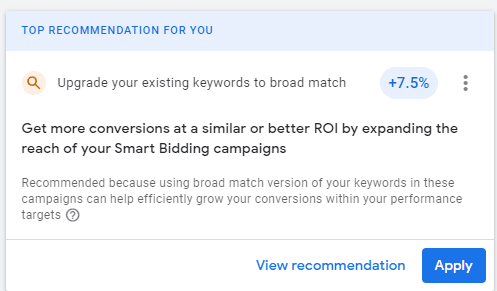
An example of the Broad Match version of keywords.
Google tries to push this recommendation because it gives them full control over what keywords to show your ads for. Doing this will maximize your spend and result in many ineffective search terms being used. Google will make a lot of money though!
Instead of using Broad Match use Phrase and Exact Match, they are better to use 95% of the time.
The only exception we can think of to this rule is if you’re using Google Ads Grant. In these cases, if you’re not hitting your $10,000/month limit, some Broad Match keywords would be okay to use to round out the budget. Just make sure to monitor your search terms so you can exclude those that are irrelevant regularly. If a term is irrelevant there’s absolutely no reason to use it.
2. Google Says, “Use the Customer Match Feature” – We Say, “It’s Usually Not Relevant”
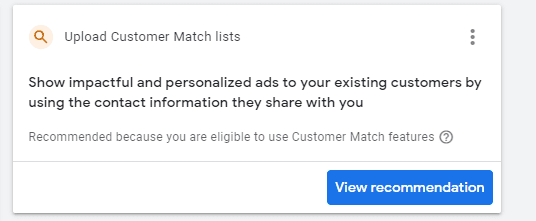
The Customer Match feature.
The Customer Match feature sounds great on paper but it’s just not going to be relevant for you unless you have a massive email list already. And unfortunately, Google suggests this option without having any idea if you even have an email list, let alone a huge one.
If you are a part of the small percentage of Google Ads users who have a big email list, then the feature is worth using as it can help you to reconnect with prospects and customers across multiple channels based on the information they’ve provided to you.
But again, most of the time, this is suggested for users who do not have well-established email lists, and without such a list, this feature is pretty much useless.
3. Google Says, “Use Irrelevant Audience Segments” – We Say, “No Way!”

An example of irrelevant audience segments.
Let’s illustrate this point with a story, shall we?
We’ve had Google suggest that we add the audience segment targeting Do-It-Yourselfers for a home renovation company that does high-end kitchens, additions, and custom homes. DIYers are definitely not the target of our home renovation company and would’ve been an absolute waste of money had we went with this recommendation.
Turn those recommendations down and keep money in your pocket.
4. Google Says, “Use Google Search Partners and Google Display Network Ads” – We Say, “No Thanks”
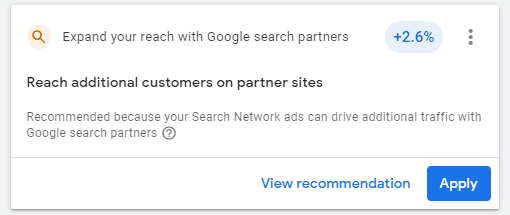
Google Search Partners
According to WordStream, 99% of the time using Google Search Partners and Google Display Network Ads will “wreak havoc on a PPC account.” And we’ve found this to be true in practice as well.
Users may not be in a shopping mood when they come across your ads in these situations. They are often doing their daily activities, reading the news or blog posts, watching video clips, and so forth. It’s just not a good use of money to spend it on GDN ads when you could put that funding toward a more targeted approach.
The only exception we can see is if you’re running a campaign to increase general brand awareness or if you have compelling video or image ads that stand a chance of breaking through the noise.
5. Google Says, “Smart Bidding is Where It’s At”? – We Say, “I’ll Pass”

Smart Bidding
While it can save you some time, Smart Bidding is generally not as effective. And since Google doesn’t know your business and you have no visibility into the data being used, Google’s broad data may not reflect your target audience. This reduces your budget control as well. This makes it a recipe for blowing your budget very quickly.
The only time it might make sense to use Smart Bidding is when you’re trying to increase conversions, specifically.
What to Do When Your Google Ads Account Strategist Wants to Schedule a Phone Call
If you’ve had a Google Ads account in use for any length of time, you have likely received one of those phone calls or emails from a Google Ads Account Strategist. And while it may be tempting to respond their free consultation offer, we generally advise against it.
Despite what they might say, a Google Account Manager’s job is to get you to increase your overall ad spend. Their job is not to increase the effectiveness of your campaign. Plain and simple.
They follow pre-written sequences and don’t think for themselves. They are not Google Ad experts; rather, they are good at following scripts and getting you to spend more.
People in these positions are also usually located on the other side of the world sitting in a cubicle somewhere. They don’t know your business or the context of your advertising needs.
It’s sad to say but these consultations are generally a waste of time and will often make your ads perform worse. Yikes!
When you get an email from them asking to schedule a call or saying they’re trying to reach you, it will often look like this:
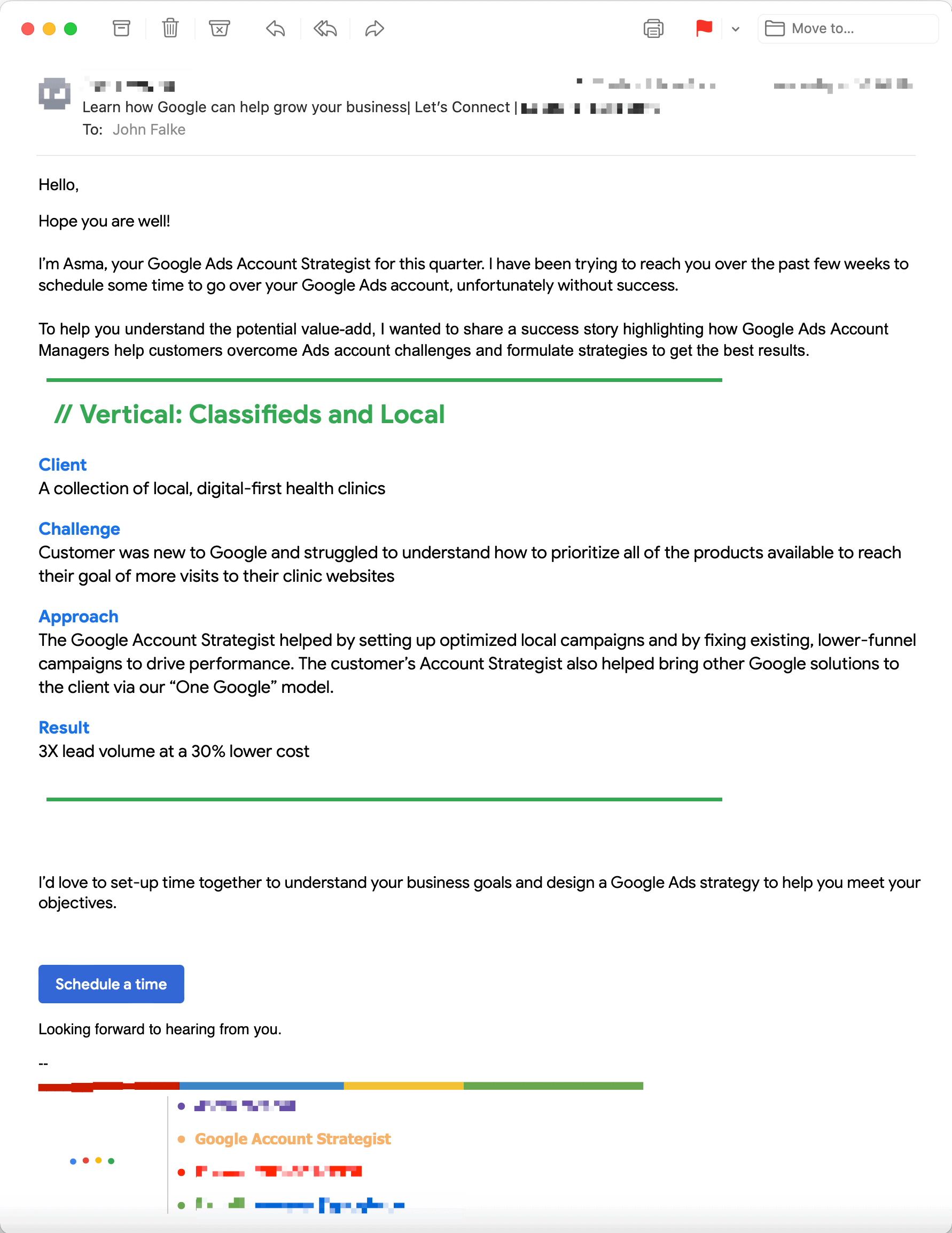
An example of a Google Ads call request.
This is another example:
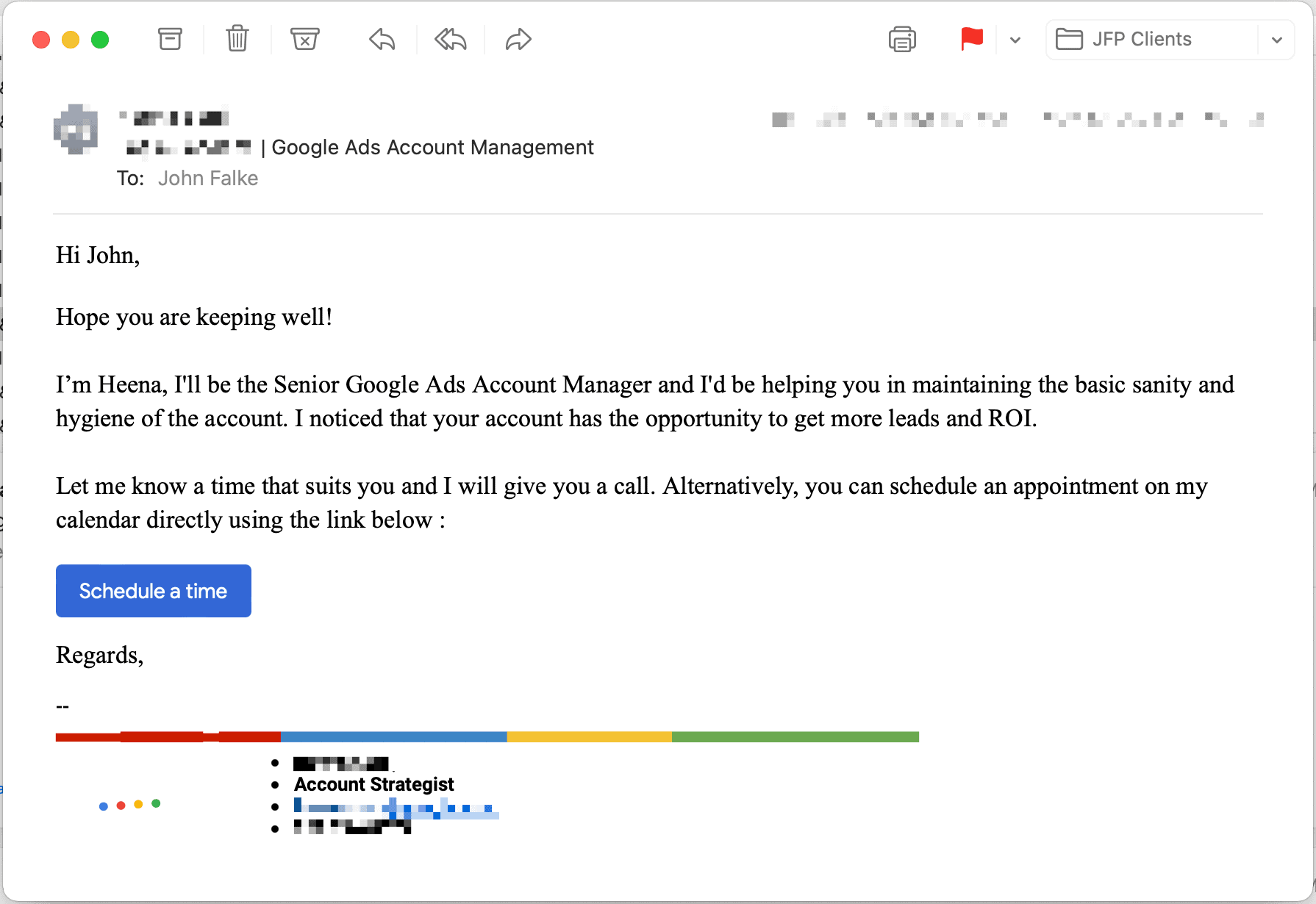
A shorter, less specific Google Ads call request.
And still another example:
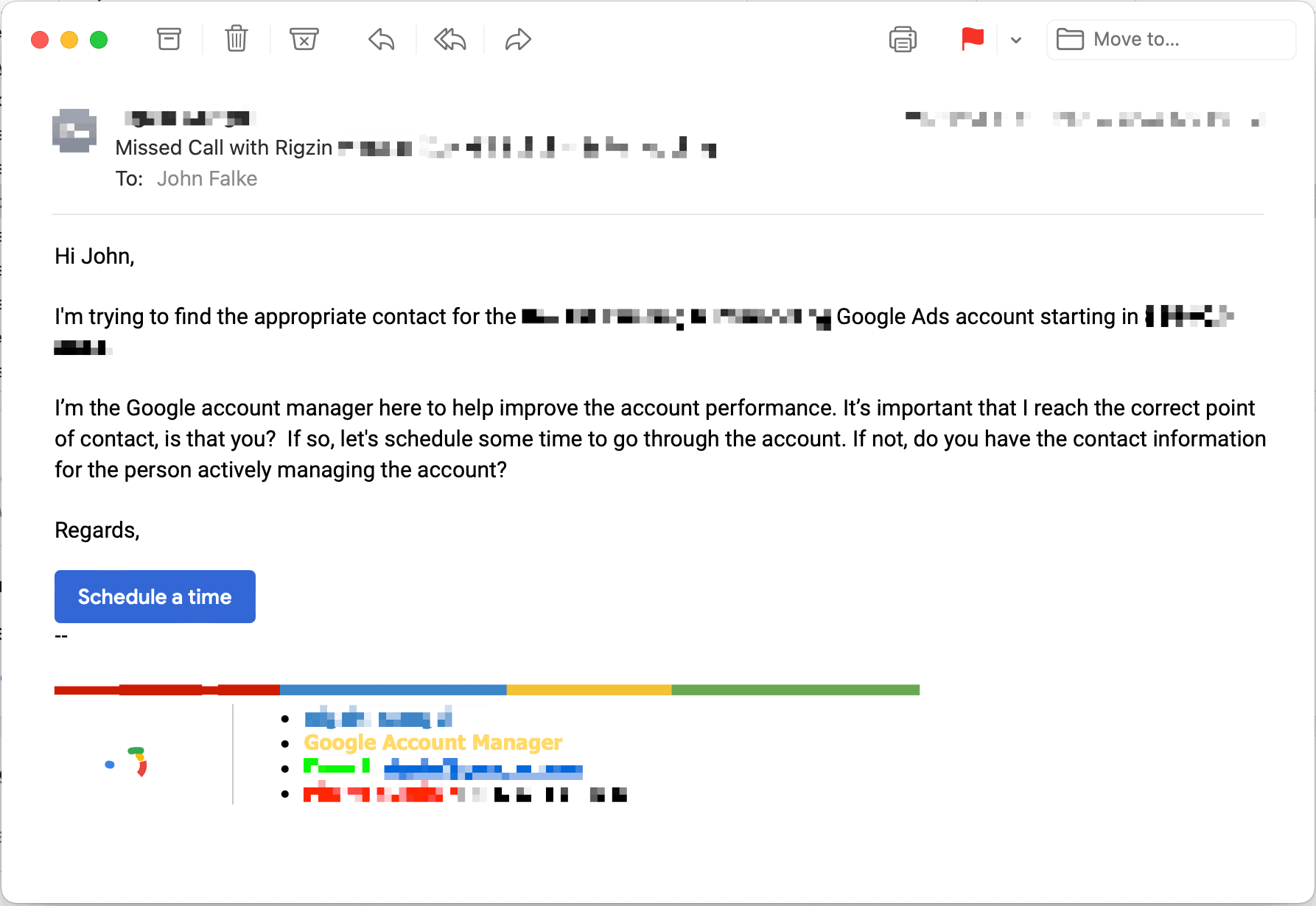
Another example of a call request regarding Google Ads.
They usually have a Google Email Address and will sound very official and helpful. They’ll also use a local phone number through Google Voice and are often very persistent. Pushy, even.
I usually just send them a short reply so they stop bothering me:
Hi,
Please stop contacting us via email and phone. We are not interested in a consultation.
Thank you,
This is the best way I’ve found to stop the onslaught.
The Bottomline?
Don’t follow every recommendation that Google offers. Many of them are designed to give Google more control so they can spend more of your money, which won’t necessarily increase your conversions or the effectiveness of your ads.
What to do next?
Want a professional to manage your Google Ads account? We at JohnnyFlash charge a flat fee for Google Ads management – not a percentage of ad spend – so we are motivated by making your ads perform the best, not for you to spend as much money as possible.
Contact Us today so we can discuss your business goals and digital marketing needs.
Share this post
Are you looking for more traffic, leads and customers? We provide on-going digital marketing to help you reach more customers and grow revenue.
About Us
Johnny Flash Productions
Johnny Flash Productions is a creative agency based outside of Washington D.C. that focuses on digital strategy, web design and development, graphic design and event production that helps businesses get better results from their marketing.
John has been managing my website SEO and Google Ads for only a few months now and his services have already generated profitable leads. I can’t say enough about his company’s professionalism, promptness and results oriented approach. Hiring his company has been an excellent business decision!!

Johnny Flash Productions is a company that truly cares about their clients, this is obvious by not only their work ethic but they also the way they put their heart into every project they complete.
Johnny Flash Productions was a pleasure to work with, we look forward to working with them again in the future.

I was looking for a web designer who was not only talented, but could deliver - and keep delivering what I needed month after month. The team at Johnny Flash Productions brought ideas to the table that complemented what I wanted to do with my website and their design exceeded my expectations.
I was willing to pay more for their continuing monthly service than I had paid previously because they laid out what I could expect from their team. So far, they have under promised and over delivered.

Exceeded all expectations in their abilities to professionally evaluate and customize our company WordPress website. Above all else, their customer service is the best I've dealt with in a long time with any company I've worked with in the past. I definitely recommend Johnny Flash Productions to anyone looking for exceptional service, professional detail and customer support.

I would like to thank Johnny Flash Productions for there great service my company has been able to get to get to the top of Google searches in half the time most companies take. I am now receiving 3 to 5 viable leads a day that all lead to service work for my company. And I can not thank them enough for all of there support with my site and maintaining it for me.

Their knowledge of SEO and integration of social media channels improved our church's online impact.

We had a phenomenal experience working with the Johnny Flash Productions team for our new website, SEO, and logo. We are excited and unequivocally satisfied with the results. Our website has received numerous positive reviews from our clients, associates, and friends. And their SEO services have already brought us new clients who found us online.

We began collaborating with Johnny Flash Productions in January 2023 with the primary goal of optimizing our SEO and achieving visibility on Google's first page. During our initial meeting, John provided thorough explanations and informed us that it could take up to six months to see results. Fast forward, and our company consistently appears on the first page of Google.

I've had an exceptional experience working with Johnny Flesh Productions for my website's search engine optimization. John and his team are not just experts in SEO, but they also make the process engaging and informative. Their prompt responses and unwavering professionalism stand out, making every interaction a pleasure. If you're looking for a team that delivers outstanding results and values client collaboration, Johnny Flash Productions is the go-to choice. Five stars all the way!"

JFP is amazing. My new website is very clean, conveys exactly what I want to my clients, looks way better than the competition, and will be the base for my company moving forward. And now I have a great working relationship with Johnny Flash Productions for all of my SEO and website needs. Don't hesitate to go with JFP, they're honest. They rock!







